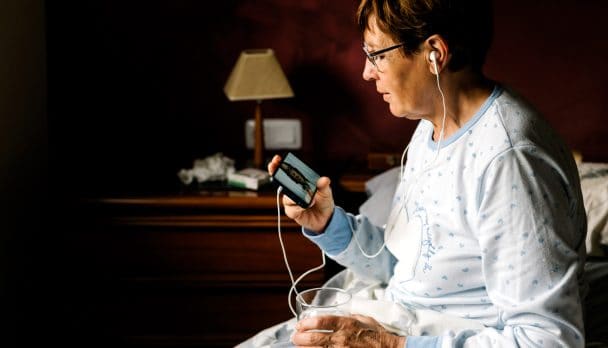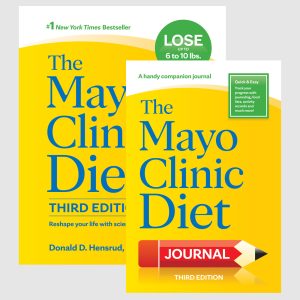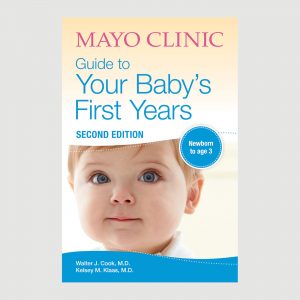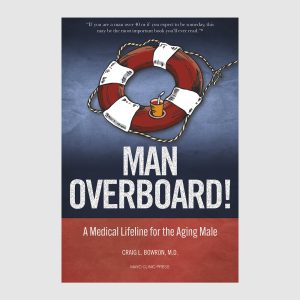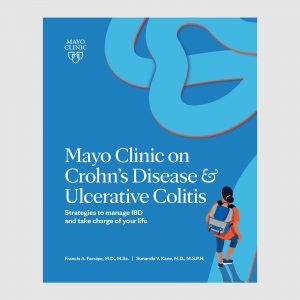The rise in diseases like Parkinson’s and Alzheimer’s could have a surprising source: the gut. Scientists are still exploring the link between the gut and the brain, but there is evidence that a balanced holistic lifestyle could reduce stress, inflammation, and, potentially, the risk of neurodegenerative conditions.
On this episode of On Nutrition, we talk with gastroenterologist Dr. Partha Nandi about his new book, “Heal Your Gut, Save Your Brain: The Five Pillars of Enhancing Your Gut and Optimizing Your Cognitive Health.”
Find us online at Mayo Clinic Press for more health and wellness articles, podcasts and books. Do you have feedback, questions or topic suggestions? Email us at mcppodcasts@mayo.edu.
Read the transcript:
Tara Schmidt: This is “On Nutrition,” a podcast from Mayo Clinic where we dig into the latest nutrition trends and research to help you understand what’s health, and what’s hype. I’m Tara Schmidt, a registered dietician with Mayo Clinic in Rochester, Minnesota.
This episode, “Heal Your Gut, Save Your Brain.” That’s the title of a new book by my guest, Dr. Partha Nandi, published by Mayo Clinic Press. He also hosts a podcast of the same name. Scientists are still learning about the connection between the gut and the brain.
But we do know that the prevalence of diseases like Parkinson’s and Alzheimer’s are rapidly increasing, and according to Dr. Nandi, those conditions start out in the gastrointestinal tract long before they become formal diagnoses. Dr. Nandi is a clinical associate professor of medicine at Michigan State University and the Chief Health Editor at WXYZ in Detroit, Michigan. His passion for gut health is in part because of his career as a gastroenterologist, but also comes from a very personal place. Well, Dr. Nandi, thank you for being with me this afternoon.
Dr. Partha Nandi: Thanks for having me. It’s my pleasure.
Tara Schmidt: I’m really excited about your book and also what we’re going to talk about today, because I think this is such a hot topic and a fascinating topic, and you’re combining this hypothesis of gut health and brain health, so I think we’re going to learn a lot.
Dr. Partha Nandi: I hope so. Hopefully it’ll be some fun too. I don’t want to bore people to death. I’m sure you’ve heard of these podcasts where people play it just to make sure they can go to sleep. We don’t want to be one of them.
Tara Schmidt: I hope people don’t play my podcast and go to sleep.
Dr. Partha Nandi: Let’s hope not.
Tara Schmidt: Let’s get into the motivation behind your book. You open by talking about your father, a brilliant scientist who had a life altering stroke. How did your experience with this condition inspire you to start writing “Heal Your Gut, Save Your Brain?”
Dr. Partha Nandi: Thanks for that, Tara. My dad was one of these renaissance guys. The smartest man I’ve ever met. If you ever drive down the road at night and you see the reflective tape on the side of the road that keeps you from going off to the side, that was my dad. He invented that reflective tape.
Tara Schmidt: Oh my gosh!
Dr. Partha Nandi: You can see he was a brilliant, innovative person whom, I think, saved thousands of lives in his career. When he had this life-altering stroke, I’ll tell you that he didn’t have any health problems, Tara. He was never hospitalized, didn’t take a bunch of medicines.
He was really quite healthy, and then, one day, he just had a catastrophic stroke, and I could not believe What happened. When I saw this, I said, “What am I missing? We did all the work up, he saw a neurologist, cardiologist, all the ‘ologists, and there was not an etiology. There was not a reason for his stroke.
I said, “I’ve got to be missing something,” and that time was 2007. We didn’t have a lot of the knowledge that we had, especially in traditional medicine, about the gut and the brain. Nobody was asking, “What do you eat?”
I mean my dad, when he had the stroke, and he went to rehab, he was given all these boost cans. Nutrition supplements. Dietitians know boost very well. I’m not saying it’s the worst thing ever, but clearly it is not what you want to give to your microbiome and to give good gut health.
You’re giving this processed stuff. Fast forward. My dad, after a decade, struggled quite a bit, but we, as a family rallied together and did everything we could. He passed away.
It robbed my dad of a decade of his life to play with his grandkids and to impart his wisdom and it was just so destructive to me and my family and I said we’ve got to be able to do something that helps others not go through what my dad did and what we did.
Tara Schmidt: Absolutely. I’m sorry for your loss. The main focus of your book is your hypothesis on the link between gut health and neurodegenerative conditions like strokes, Alzheimer’s, and Parkinson’s disease. You compare the gut brain connection to a fiber optic cable. Can you explain that?
Dr. Partha Nandi: The gut and the brain are connected by the vagus nerve. It’s the longest nerve in the body and they’re constantly talking. I equated it to two teenagers who’ve just been to the Taylor Swift concert and are constantly talking about it.
The gut and the brain are texting and they’re messaging all the time, of course. They’re sending GIFs and whatever. Obviously being a little facetious and using metaphors here, but they’re communicating nonstop and by communicating. What are they using? They’re using neurotransmitters. They’re using signals to communicate and the communication is bi-.directional. It’s not just from the gut to the brain, but the brain to the gut.
But we have some indirect ways to be able to communicate. I talked about neurotransmitters. Very few people may know this, but we call our feel good hormone serotonin. It’s a hormone that kind of helps us to be energetic and vibrant about life. 90-95 percent of it is produced in the gut. Also serotonin has effects in gut motility, meaning movement of the gut.
Remember serotonin, if you don’t have adequate amounts of this neurotransmitter, you often don’t have the joy that you may have in life. Many drugs that help with mood and affect are serotonin.
Tara Schmidt: They’re SSRIs.
Dr. Partha Nandi: Correct. We’re talking about that same system.
Tara Schmidt: You have neurotransmitters that are created in the gut that actually affect the brain. What are some other examples of how the brain and the gut interact?
Dr. Partha Nandi: This is something that holistic medicine or alternative medicine has talked about for decades, but now in gastroenterology, we talk about it and it’s called the gut wall and the gut wall integrity.
What that means is when you look at the gut wall between poop on one side and blood on the other, it’s one cell layer thick. That one cell layer thick is preventing all that stuff that you’ve eaten, that’s now converted into something that we don’t want.
Tara Schmidt: Correct. So going into the blood, right?
Dr. Partha Nandi: If you don’t have that gut wall integrity, meaning the gut wall is strong, then stuff from the inside of your gut, let’s call it poop-like stuff, can go into the blood. Now we’re not talking about big pieces, we’re talking about microscopic little particles that can go through.
When that happens, your immune system and your protection system is activated. Because your body is very, very protective of stuff getting in the blood that’s not supposed to be there. When you have these little particles go through, then the inflammatory reaction cascade begins, which means every inflammatory cell that’s around it’s going to come in and say, “Hey, what’s going on? I don’t like you,” and start this cascade. How does that affect the brain?
If you have this happen once in a while and you have what’s called intestinal permeability, and if that inflammation continues, it goes throughout your body, but not just in certain parts of your body, it can actually go to where the brain is which is where the brain also has a barrier called the blood brain barrier. The brain doesn’t like things coming into it. It protects itself. That’s disrupted, and then you begin the inflammation that happens in the brain.
A lot of these diseases that we talk about in the book, diseases like Alzheimer’s, like Parkinson’s, how can we try to prevent stroke, and we know now that diseases like Alzheimer’s are not inevitable. It’s not just because you’re old and this is what’s supposed to happen. It is a consequence of unabated or Inflammation that you really don’t need and it continues on. The immune system of the gut wall is incredibly complex. If the immune system of the gut is also not working well, then what happens is that the inflammatory cascade I just talked about.
Tara Schmidt: What about the part of the gut that we hear a lot about? The gut microbiome. How does that play a role in the gut brain?
Dr. Partha Nandi: The microbiome, that term is used very loosely, but it’s really the trillion plus member army of bugs that are in our intestinal tract, and not just bacteria, but bacteria, protozoa, viruses, and fungi, all of them together. They’ve been with us for many thousands and thousands of years. In fact, some of the bacteria that we see in the microbiome predate us. They’re 15 million years old.
They’ve developed ways to be able to communicate with each other. What does that have to do with the gut and the brain?
The microbiome when it works well in concert is kind of like an opera playing. You got all these bugs that are all in harmony and they’re producing substances that we call, in this field, postbiotics. The prebiotics. Just for language, is the food that we give to the bugs, which are called the probiotics. The products that they produce are postbiotics. One of the products that they produce are neurotransmitters.
When we look at serotonin, they’re produced in large parts by the microbiome. If you don’t have a good microbiome in the gut, it can affect what happens in the brain. Now we’re seeing that when you have the wrong set of microbiomes, you can really suffer. You’re not making the neurotransmitters. Your gut wall integrity is often dependent on short chain fatty acids which are produced by the microbiome. Making sure the microbiome is healthy and you’re giving it the right environment is so important.
Tara Schmidt: Let’s talk about good nutrition while we’re on the topic of feeding ourselves and feeding all of the good bugs that are in here. What do you encourage people to do to improve or connect the role of nutrition’s role with gut health?
Dr. Partha Nandi: Remember fiber is basically the food for these bugs. Prebiotics often have fiber and if you have foods with fiber that feeds those bugs. Absolutely if you increase your fiber, I also ask people to be able to try to do something revolutionary, and you gotta hold on to your seats here. I want you to go into your kitchen and actually not sit there with your cup of coffee and talk to people. Actually create a meal. Use whole foods that you recognize not from a packet of something, or a box of something.
I’m even somebody who doesn’t love these meat, meal planning kits where they just come in the mail and you heat it up and it’s voila, but to me it’s really about taking a whole vegetable, a whole fruit, cutting it up, and actually sharing it with your family. You get the nutritional aspects of having, like you said, more plant based foods that are whole, that you know what’s going on, increasing your fiber. I also really recommend having fermented foods in each one of your meals, if you can. Foods like sauerkraut or yogurt or kimchi or tapashe, or Kombucha. Just tons and tons.
Every culture has them. You have to just look and see if you like them. Whatever it is that you like, you can find a variety. I think you can have that with any meal if you do that with every meal. What fermented foods have are basically good bugs that you’re adding to your trillion member army. Imagine you’re fighting a war. Believe it or not there’s a war at all times in your gut with the good and bad bugs, sort of like vying for dominance. It’s like you’re the general of an army, and you’re constantly contributing to the good guys. You’re contributing to your army by giving billions of these good bugs.
By Eating those types of foods every single day. If you can avoid processed foods. Some people cannot go out to whole foods and spend their whole paycheck doing it. Do the best you can. Try not to eat anything in a box or a can. But we talk about bad processed carbohydrates, but there are bad fats as well. To me, a pepperoni pizza is an atomic bomb to your microbiome. You got bad fats, processed foods, preservatives, all of them. People say, well, who cares? Here’s why it is bad.
It’s because we’ve introduced this stuff into our bodies over a period of 50 years, not 10,000 years. But if we maybe had some gradual changes, like maybe putting on a little preservative once every thousand years, maybe our body would know what to do with it, but it is completely confused because it’s your body’s seeing preservatives. Foods that are manufactured in certain ways. It doesn’t even know how to process it, and when you do that, you confuse the body’s immune system. You confuse the body’s processing system. You become predisposed and your immune system can go awry and then that whole system of inflammation I talked about where you can have intestinal permeability can begin.
That’s the beginning of things like autoimmune disease, things like Alzheimer’s disease, Parkinson’s. I mean, can you imagine that the Alzheimer’s that people have at age 70 actually begins at age 40, right? The Parkinson’s that begins at age 60 has already started at age 30.
Tara Schmidt: You’re saying these diseases develop over time. They don’t just pop out of nowhere.
Dr. Partha Nandi: Correct. When you see people with Parkinson’s disease, you can have symptoms in their GI tract that predates it by decades. If you have constipation and bloating, those symptoms come sometimes even 15 to 20 years later. Before your Parkinson’s. We actually now, in mouse models, not in human beings, can see in Parkinson’s disease, you have these Lewy bodies that are in the brains of the patients with Parkinson’s.
Lewy bodies are just misshapen proteins. In my mouse models you can see them in the walls of the gut. You’re like, “What is that doing here?” You’re supposed to see it in the brain, but you have those same changes in the wall of the gut. When you see one of these misshapen proteins for some reason it influences the next one to be misshapen. These are again animal models, but it gives you a sense of perspective of what could be happening. In fact the hypothesis is called “the gut first hypothesis.” These alpha syncline proteins actually go up the vagus nerve.
In the models, when they sever the vagus nerve, this is no longer happening. You can see how important, or how critical it is to be able to talk about nutrition. When we go back, what do we ask our patients? To do very simple things. Every meal have fermented foods, avoid, if you can, anything in a can or a box, and try to have whole foods that you prepare in the kitchen.
The other thing I tell them, and this is something that we do as a family, try not to eat out. Because when you eat outside, especially if you’re really watching your gut health, it’s very difficult to monitor what they’re doing in the kitchen. They’re not there to help you to enhance your gut health.
There’s a middle ground too, or I should say maybe there’s a transitional period. If going completely whole food, plant based. Eliminating ultra processed foods seems impossible, or seem really, really like a far stretch from someone’s current lifestyle and their environment or their food environment.
I always tell people, if you look at this product, let’s say a chip, for example, can you guess what the first ingredient is? It’s not a riddle. If you’re looking at something, do you have a good idea of how they made this? Or sometimes I’ll say, do you think my grandma could make that? My great grandma can make anything.
Tara Schmidt: The gut and the brain are connected by one of the longest nerves in the body. The vagus nerve. Through that nerve, they communicate neurotransmitters like serotonin. In fact, 95 percent of our serotonin is produced in the gut, which explains why you might feel butterflies in your stomach when you’re excited. But more importantly, when there’s inflammation in the gut, that may become inflammation in the brain as well, which can develop into diseases like Parkinson’s and Alzheimer’s.
According to the Alzheimer’s Association, nearly 7 million Americans have Alzheimer’s, and that number is expected to grow; possibly because of the widespread use of ultra processed food, which may contribute to inflammation. If neurodegenerative conditions are a concern for you and your loved ones, consider preventive measures like focusing on whole foods, fiber, and fermented foods like kimchi and kefir. While diet is crucial, according to Dr. Nandi, caring for your gut is both a lifestyle and lifelong pursuit. Dr. Nandi, What are some early indicators from our body that our gut health isn’t as healthy as it’s supposed to be?
Dr. Partha Nandi: When you have your body telling you something, you have to listen to it. When you have discomfort, it’s a sign that something is awry. It doesn’t mean that you’re dying tomorrow, it doesn’t mean that the world is exploding, but it’s giving you signs that something may be wrong.
Your body’s telling you, and along with your microbiome, “Hey, we don’t like what’s going on. Can we shift it a little bit? Can you perhaps drink more water?” It’s a signal that something may be happening and now we know it’s not in human studies, but we can see relationships between diseases like Parkinson’s and Alzheimer’s that you can see symptoms of your GI tract, especially in people who are at risk, they should really pay attention.
If you’ve got a family history of Parkinson’s and you feel that you’re at risk and you’re getting some bloating and constipation, take that seriously, but also be proactive and ask your gastroenterologist, “Hey, can I tell you about my family history of Parkinson’s disease?”
If you’re having some issues of perhaps forgetfulness, or you notice a new tremor, let them know what your GI symptoms are. Because more often than not, most of my colleagues who are neurologists and gastroenterologists are not asking those questions. They’re not asking when you come in for bloating and discomfort, “Are you having any issues with brain fog or memory loss or have you had a family history of Parkinson’s?” Typically they’re not.
I think the idea is that be aware, don’t panic and go into a frenzy that you’re going to die. It’s not that, but you now have the opportunity to be what we call “your own health hero.” I write about this in the book that you can now take control of your health. Your destiny is not already determined. You can make small changes that we talked about today that can affect you 10 or 15 years from now.
Tara Schmidt: Much of what you’re talking about is prevention. We don’t want to wait until a diagnosis to be like, “Oh, well, I should have such and such.” We want to do what we can now. But it’s hard, I think, for some people to find the motivation to do it now when they are young and or healthy. I feel like you’re motivational interviewing me right now. I feel pretty good right now about what I’m going to do for dinner. In your book, you talk about this five pillar approach to brain health and gut health in a holistic way. Let’s go through them. Number one is a purpose-driven life, right?
Dr. Partha Nandi: A dozen studies have shown that when you have purpose-driven living then you have decreased heart disease, decreased cancer risk, decreased diseases like Alzheimer’s. You have less unrest, your body is in more homeostasis, more at ease. What that does is decrease what we call our fight or flight response. It’s not as dramatic as your heart rate going at 120, but at a microscopic level. If you are constantly in a job that you don’t like because you got stuck in it, or if you’re in a relationship that you don’t really want.
With every activity that you do on the whole that you don’t like, or you’re despising it, imagine what that’s doing to your body. When it wreaks havoc in your body and you’re creating this increased cortisol, an increase, your reticular activating system is increased, all the hormones that are increased when you’re at unrest. You may not feel it, but on a microscopic level that happens. My first pillar is purpose-driven living.
Tara Schmidt: Then the next pillar is my favorite, nutrition. Let’s clarify, prioritizing your gut health with nutrition is about having a plan. It’s not the exact same thing as a formal diet, right?
Dr. Partha Nandi: That’s exactly right. But most diets are synonymous with failure because it’s not sustainable. To me, it’s better to have just a nutrition plan, where you think about, “How am I going to eat?” It’s gotta be stuff you like, because if you don’t like it, eventually you’re going to break, and then you’re going to have what The Rock calls a binge. He has his cheat day, and if you see his cheat day, it’s incredible, it’s the, “I don’t know how any human being can survive that,” but eventually you break, so people break their diet.
Tara Schmidt: When you have a holistic dietary plan, we just talked about that, that’s super important. It’s also important that your diet includes all the fiber and fermented foods we talked about earlier for good gut health. What’s next on the list?
Dr. Partha Nandi: That’s the third pillar, which is movement. Enhancing your brain health, your gut health by just moving your body. The blood flow is going throughout your entire body and it’s just sustainable for health. It’s not just movement. I have this really giant workout facility next to me, and I love it. My favorite hobbie on a weekday, when I have a couple minutes, is to watch vultures. Some people go, “What, you’re in Detroit? I didn’t know they had vultures.” But these vultures are special, they’re in Toyotas, and they’re in Volkswagens, and they’re in Teslas and they’re circling the parking lot, circling and circling, and they’re trying to find the closest parking space to the gym so they don’t have to walk even a single step. If they could, somebody could lift them on a chariot, take them, and put them on the treadmill.
See, and that’s not purposeful movement. You go to the gym a couple times a week and then you’re done. Purposeful movement is playing with your kids, running around the yard, working in the garden, taking two flights of stairs to go to work. It’s movement that actually creates some kind of activity that helps you. Otherwise, you’re like, “I gotta go to the gym again.” You would not believe how many people say, “I gotta go to the gym again,” or I gotta do this again. They hate it. Find an activity. It doesn’t have to be that you’re lifting 500 pounds over your head and throwing it down. It can just be a simple movement.
Tara Schmidt: Well said. What about the fourth pillar? Community.
Dr. Partha Nandi: You want to have a community around you. Some people call it a tribe as well. We now also know when you have community, the same idea that I talked about when you have purposeful living, you have support within a group and when you have support you have less unrest. The definition of dis-ease. That’s what we treat. When your body’s not at ease when you have a community of support it helps your body to be at that homeostasis, reducing the fight or flight response of unopposed inflammation and cortisol.
There was a famous study done in Roseto, Pennsylvania, a group of Italian immigrants in Pennsylvania. It was called the Roseto Effect. In the 1950s there was a physician who visited that community and saw that in the 1950s, virtually no heart attacks, and tons of people living in their 80s and maybe 90s. He said, what gives? He did all kinds of studies to find out. He said, what gives? What factor is it? There’s only one factor that was different from the rest of the country, and that was community. Italian immigrants, when they work together… When they’re coming home they say “Hello, how are you doing?” Then they talk.
Nowadays, if somebody asks you how you’re doing and you tell them more than one word they’re like cringing, “Oh my God, he’s going to tell me everything about himself” or herself, but this community actually wanted to hear from you and they wanted to cook together and play together. That sense of community protected them.”
Tara Schmidt: That’s beautiful. And what about the last one? Spirituality?
Dr. Partha Nandi: There’s so much unrest on the planet. You try to figure out your place and how you belong on this planet. To me spirituality gives you that and it could be yoga,
it could be prayer, Tai chi.
I like meditation. I meditate every single day, even if it’s for five minutes. Even if I’m traveling. What that does for you, again, is gives you that sense of tranquility and ease. The same concept of not having that unopposed stress that you don’t need every single day. We drove today. I got rear-ended and instead of going, “How could this happen?” You stay calm and you stay within yourself, but that’s not something that happens automatically. That’s practice. Imagine if you do that. You decrease the chance of that inflammation, you decrease the chance of that unrest in the fight or flight phenomenon. To me, it’s just a part of a plan that can really enhance, not only your gut and brain health, but your overall health.
Tara Schmidt: What are the relationships that we’re talking about between the pillars and the gut microbiome itself?
Dr. Partha Nandi: When you have purposeful living, you have less unrest, you decrease the amount of cortisol and inflammation throughout your body. When you have decreased inflammation, you allow your gut to be healthy, you allow the gut microbiome to be more in harmony. The microbiome is giving you products that then make your gut wall strong. It’s producing enough of an environment that your immune system is working in concert with the rest of your body.
When that immune system is strong and not dysfunctional you’re not allowing for example intestinal permeability, or leaky gut. When you don’t allow a leaky gut guess what happens, you don’t create inflammation, not only around your gut, but the rest of your body. Remember, many of these diseases are inflammatory in nature: Alzheimer’s and Parkinson’s. I talked about Alzheimer’s. You can actually have these amyloid bodies and neurofibrillary tangles. These are just words that are the effects of inflammation that’s unopposed in your body. Now, because of the fact that you have inflammation in the brain, the brain has something called the blood brain barrier.
That’s a very strong, tight connection where it doesn’t allow many things from your blood to go into your brain when it’s broken because of inflammation. When you have tiny cracks in the blood brain barrier you can begin this inflammatory cascade and that inflammatory cascade can lead to Alzheimer’s and lead to Parkinson’s. When you go back to the five pillars, it gives you a five pillar methodology to be able to fight that even after you have the disease, but more importantly to prevent them.
What we want to do is prevent gut inflammation, prevent the gut wall from not having great integrity and not having a lot of leakiness and not having intestinal permeability. Lastly, having a healthy microbiome, which is associated with great health. People with Alzheimer’s. We talk about an Alzheimer’s gut. People with Parkinson’s, people with bad stroke outcomes have certain groups of bacteria and microbiome that we see. We’re trying to be able to get the gut health fortified, but not just using one tool, using all five pillars. Every three seconds someone gets diagnosed with dementia. Every six seconds someone is diagnosed with Alzheimer’s. Every four minutes someone dies of stroke. We’re talking about a gigantic problem. If we can make a dent in it, boy, that’d be great.
Tara Schmidt: Absolutely. This may seem overwhelming for some people. There’s five different things that I have to change. When people are, especially looking at nutrition or looking at lifestyle changes, sometimes it feels like you’re in this uphill battle. Do you recommend baby steps? Do you recommend fully embracing one pillar at a time or all five pillars? How long can someone expect to maybe see results internally or externally? What’s the timeline?
Dr. Partha Nandi: This is not Houdini time. It will not happen within hours or a magic pill. But I think here’s what I tell people to do, if you can pick one activity from these five players a day, consistently, within four weeks, you will notice a difference.
We’re talking about all of the things that people ask for right? Which is to me living a more joyful life, a more fulfilled life. Perhaps even if you really adhere to a diet plan? You can see some weight loss. You can have energy and then you may actually even sleep better, which leads to more energy.
Again, like you said, baby steps. If you can do one of these steps of each pillar, every single day, you can make this happen. One of my favorite athletes is Tom Brady and he said, “I may not be better than any of my colleagues. I think I’m just as good as them and maybe not as talented, but I do something that’s really important, that’s being consistent.” It’s the consistent changes you make every single day that really leads to these changes. That’s why, to me, the most important pillar is purpose.
Tara Schmidt: We may not be able to go to California and do like a week long yoga retreat where they only feed you juice and organic things, but we do eat at least, most people, three times a day, right? Let’s take breakfast tomorrow and see what we can do to improve our breakfast. Let’s take the next time we’re going to meet with a friend or you initiate a meeting with a friend. Okay. There’s your community. I have a friend who refuses to do anything with me, but goes on walks. I’m like, “Ugh, can we just sit at Starbucks, please?” But she loves it. Every single time I see her, we get a tea and then we go on a walk.
Afterwards I feel like a new person, I feel like I was therapized in the best way possible. There are little opportunities that we have, probably for all five of these pillars in the day, just like you said, we don’t need to circle the parking lot of the gym, everyone.
Dr. Partha Nandi: That’s right. Don’t need to be a vulture.
Tara Schmidt: Those are great examples, though. That’s exactly it. We’re not that far off from when we were hunters and gatherers, despite the fact that we think we’re very sophisticated. Our body and the way it’s engineered still remembers those days. If you can kind of engineer yourself to be a little bit more simple in the things that you do, your body responds and in turn, your microbiome and in turn, your brain will respond in a good way.
Constipation and bloating are an indicator right now that something is off in your gut. But later in life, they could be an early signal that something’s off with your brain too, especially if you have a family history of Parkinson’s, Alzheimer’s, or stroke. But there may be a holistic way to start treating your gut, and by default, your brain. The five pillars. Purpose, nutrition, movement, community, and spirituality. The main driver is purpose. Living a life that aligns with your purpose includes eating foods that make your body feel good, integrating movement into your every day, tapping into your life and the people around you and understanding yourself as well as your place in the world.
All these factors may lead to less stress, less gut inflammation, and therefore less inflammation in the brain that could lead to neurodegenerative disease. Adopting the five pillars doesn’t mean you have to overhaul your life tomorrow. It means making gradual choices to protect your gut and eventually your brain too. Who knows, you might also experience better health and more joy on your journey. Now, let’s see what else we can learn from Dr. Nandi’s research and more of his tips for a balanced gut and brain. You have some recipes in the book and you’re talking about intended to change the course of a stroke or Alzheimer’s and Parkinson’s. Do you have a favorite recipe that you want to tell us about?
Dr. Partha Nandi: I have the book right here. Coconut curry chicken. I love it.
Tara Schmidt: That sounds so good.
Dr. Partha Nandi: You just take some chicken breasts and curry powder and milk and put in some peanuts. I’m of Indian origin, so we eat foods with turmeric and cumin all the time.
I call them super foods or foods with superpower that really can help your gut health. We know that if you actually put turmeric in your food that your microbiome actually is more favorable. It can thrive. We know that it actually helps with immunity in general, but also gut health.
In these recipes we make pretty simple connections to say, “Okay if you include these ingredients in your food, like good fats, good oils, lean protein, and then also the spices that can really protect your brain and optimize your gut health. It’s simple and practical and you can get most of the ingredients at your local grocery store and it’s not expensive.
Tara Schmidt: We want people to become comfortable, especially like you said, cooking with turmeric, et cetera, not just saying, “Okay, well, I’m going to go buy a supplement.”
It’s not the same. You guys, you’re going to cook with it. I think the more you start experimenting, the more you’ll come to love it and find the recipe that is your favorite and kind of what your family can enjoy as well.
Dr. Partha Nandi: 100 percent and you said it so well. I’m not against supplements and I get it. For some people that’s all they can do, but if you can do better, get the supplement, quote unquote, in your food. Turmeric mixed in with your food is better than taking a pill. Ginger that’s mixed in your food is better than taking a ginger pill, etc.
I know. I think that we try to really preach to our kids about that. We try to have foods that incorporate those nutrients and everybody’s looking for a hack, and at the end of the day, the hack is really try to do it yourself and try to figure out what works for you. The rewards are exponential. It’s so much more than what you think. It’s not just the nutrients, but we talked about the joy of cooking, the creativity, the community, the spirituality. To me, it’s a joyous occasion of cooking, and if you don’t like it, try it and you’ll be surprised by the kind of results you get.
Tara Schmidt: When you were talking, I was thinking you can’t hack spirituality. If you want to have a nap that helps you with meditation, I’m all for it. That’s fabulous. I usually fall asleep. However, you can’t hack purpose. You can’t hack movement. You have to do it and it doesn’t have to be a complete 180 from where you currently are.
Dr. Partha Nandi: I mean, despite the fact that we have all these hacks, we have every single book, and social media post, et cetera. We’re not getting it right. The fact that people have to come to see me every single day and I’m seeing 20 plus patients a day there’s something that’s happening. If we don’t do anything about it our path is not one that’s favorable. It’s just going down a path of just surviving and not thriving and having symptoms that don’t allow you to have joy.
Again it’s just simple tweaks in your behavior that change it. I noticed differences when I began this journey many, many years ago. When I was a teenager in college, it was Mountain Dew, baby. Every single day it was a chicken wing Tuesday. It was me against the chicken wings and I was going to win, man. We all have our journey.
None of us are perfect. But I realized and thought, “What am I doing to my body? What am I doing to my health? What am I doing?” That was that. I was not thinking clearly.
After this you feel bloated and uncomfortable and then you complain about it and do something about it. None of us have just magically came and knew everything.
It’s just all of us are on the journey together. We’re all imperfect creatures, but if you’re given the knowledge again, you can do better. And that’s the whole idea here.
Tara Schmidt: Dr. Nandi, what do you want to achieve with this book? What’s the purpose of the book, so to speak?
Dr. Partha Nandi: Think about this thought that that one day someone you love will not remember your name. I mean if you think about that, it’s heartbreaking and it’s not just theoretical. The rate of Alzheimer’s is not just going up on a slope. It’s exponentially right because the habits that we’re creating in this part of the world the rest of the world is taking.
It’s really an opportunity for us and that’s the purpose of this book is really to have people say, “Hey, should I be looking at my gut health? Can I do better? That’s all I’m asking for is that we think about what we’re doing and say, “Hey, can we make a couple of steps to make a difference?”
That may be all we need to begin the process. It’s a catalyst to be able to change it. The main thing that my patient’s worried about is losing their mind. Then not having their faculties. We now know that it’s not an inevitable condition, but rather can be changed if we decrease inflammation. You can even change stroke outcomes. Your point about prevention is absolutely correct, but I would even encourage people who are listening, who have loved ones, or if you’ve had a stroke or suffering from Parkinson’s or Alzheimer’s, it’s still not too late.
You can still make changes in your life that can make a difference. It’s not just your chronological age, but it’s really about what’s going on in your gut that could make a huge difference. Imagine if I could tell my dad that after he had the stroke, he would have done better? That’s what I want to convey: could we do better than we’re doing now? And I think the answer is a resounding yes.
Tara Schmidt: You bring up a fun point of the comparison between chronological age versus biological age, and humans are living significantly longer than we have in the past, which is great, but those extra years are not necessarily healthy years. It doesn’t really matter if you make it to 100 if 65, 70 plus you’re not yourself, right? Or you’re not feeling well, or not doing well. It’s not about the number at the end of the day.
Dr. Partha Nandi: If you do the things we talk about, you can be a centenarian. You can be 100 years old, 80 or 90 years old and thrive and not, not in a nursing home with tubes in every part of your body. I mean, to me, that’s not the definition of thriving. But if you internally feel the best that you’ve ever felt, no matter what your age is, that’s what thriving means. Living a joyful life surrounded by your friends and family, and enjoying it.
That’s what we all want at the end of the day, right? We have all kinds of surrogates about big cars, big houses, and all kinds of toys, but at the end of the day, we all want to be able to live a joyful, healthy life. Here’s a prescription that lets you start to do that.
Tara Schmidt: I love that. Well, Dr. Nandi, thank you for sharing your knowledge. I’m absolutely motivated. I’m like, all right, let’s go clear all the pantry tare. Let’s go. We’re getting rid of some stuff tonight.
Dr. Partha Nandi: I’m glad.
Tara Schmidt: As it is, it’s going away. Thank you for your time and sharing your wisdom and congratulations on your book.
Dr. Partha Nandi: Thank you for your time and your wisdom. I appreciate you giving me the opportunity to to talk to so many people that are blessed to be able to get your podcast, so I appreciate it.
Tara Schmidt: We’re still waiting on a cure for diseases like Parkinson’s and Alzheimer’s, but if taking care of your gut can play a role in prevention, it’s worth pursuing. If there’s one major takeaway from Dr. Nandi’s book, it’s that it’s never too late to care for your gut and your brain. Dr. Partha Nandi is the author of Heal Your Gut, Save Your Brain: The Five Pillars of Enhancing Your Gut and Optimizing Your Cognitive Health.
The book is published by the Mayo Clinic Press and available now. For more information, check out the show notes. That’s all for this episode, but if you’ve got a question or topic suggestion, you can leave us a voicemail at 507 538 6272. We might just even feature your voice on the show.
For more “On Nutrition” episodes and resources, check us out online at mayoclinic.org/onnutrition.
Thanks for listening! Until next time, eat well, and be well.
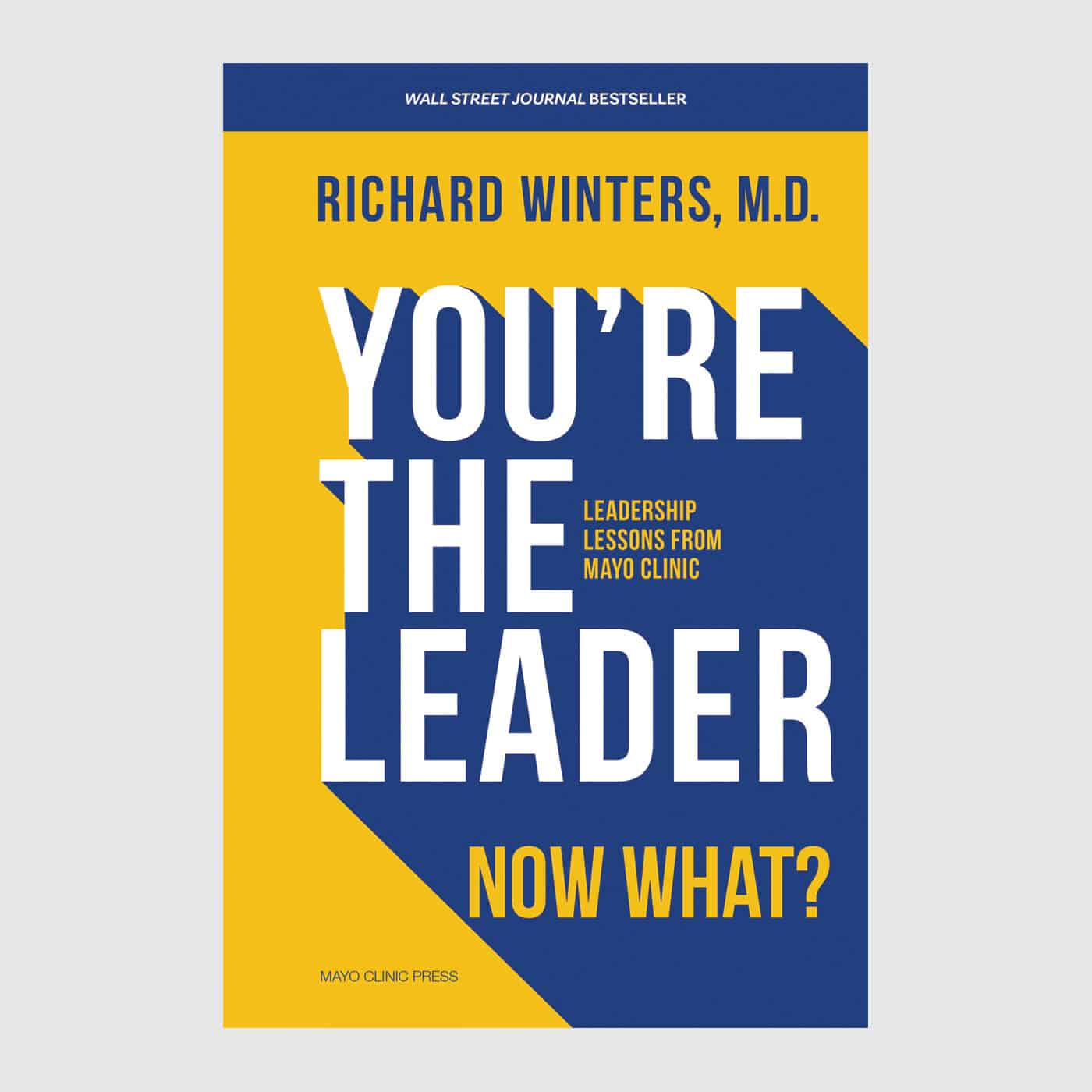
Relevant reading
You're the Leader. Now What?
You’re the Leader. Now What? provides proven strategies that will help you lead through those times when colleagues disagree, emotions run high, and your leadership skills are put to the test. Through engaging stories and proven processes, you will master specific techniques used by Mayo Clinic leaders to address conflicts and setbacks, employ organizational learning, and enact lasting change in your organization.


